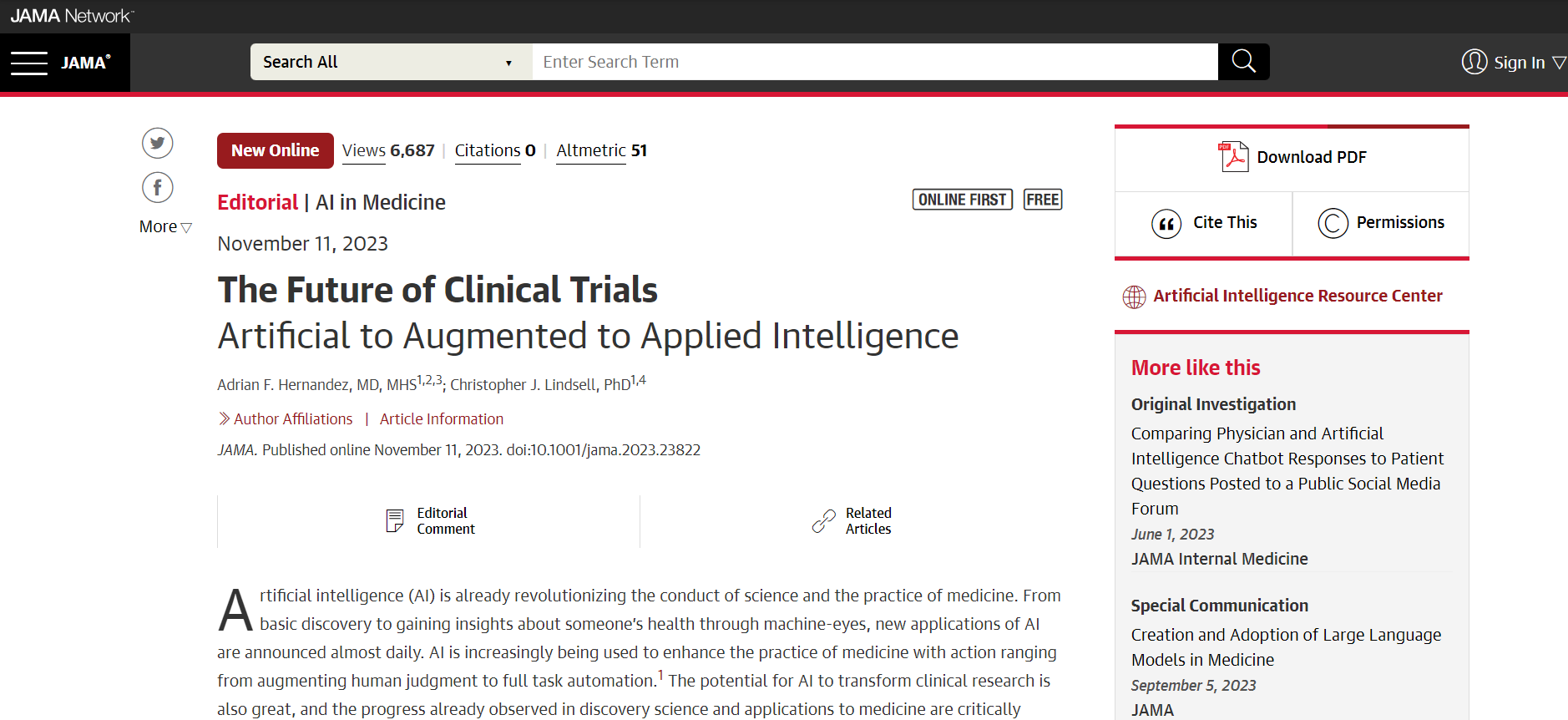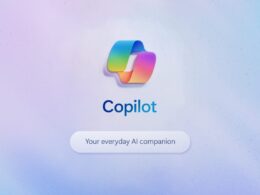the health strategist
institute for strategic health transformation
& digital technology
Joaquim Cardoso MSc.
Chief Research and Strategy Officer (CRSO),
Chief Editor and Senior Advisor
November 14, 2023
What is the message?
The article explores the transformative potential of artificial intelligence (AI) in clinical trials, emphasizing its application in improving efficiency, reducing costs, and enhancing the overall quality of the research process.
It discusses a specific study on the use of natural language processing (NLP) models in heart failure hospital adjudication and highlights the need for a framework to ensure the reliability and trustworthiness of AI-generated outputs in clinical trials.
What are the key points?
Current Challenges in Clinical Trials: The article begins by addressing the challenges faced by the current clinical trial system, including high costs, lengthy time frames, recruitment difficulties, and the disconnect between research and medical care.
Potential of AI in Clinical Trials: It stresses the potential of AI, particularly NLP, in revolutionizing clinical trials. The application of AI in event adjudication, as demonstrated in the study, shows promise in improving the efficiency of multicenter clinical trials.
Study Findings: The study discussed in the article focuses on an NLP model for heart failure hospital adjudication, showcasing high agreement with trial-adjudicated outcomes. Fine-tuning the model further improved agreement and approximated human reproducibility.
Efficiency and Cost Savings: The article suggests that implementing AI, particularly in tasks such as data transfer and verification, can lead to significant cost and time savings in clinical trials. The potential benefits are highlighted, especially when applied to trials on a global scale.
AI Opportunities in Clinical Trials: The article outlines various opportunities for AI in clinical trials, including engagement and recruitment of participants, optimizing trial operations, and facilitating analysis and dissemination of trial data.
Consideration of Risks: Despite the potential benefits, the article acknowledges the importance of managing risks associated with AI in clinical trials. It emphasizes the need for a transparent framework to evaluate benefits and risks, addressing issues such as reliability, transparency, generalizability, bias, and privacy.
Urgency for Oversight: As the transition to AI-augmented clinical trials accelerates, the article stresses the urgent need for a transparent framework to evaluate benefits and risks to prevent ethical failures.
Call for Open Science: The article advocates for open science, encouraging the sharing of weaknesses, flaws, or failures in AI applications for clinical trials. It emphasizes the importance of rigorous evaluation and publication of AI tools in peer-reviewed publications to build trust in their use.
Conclusion: The article concludes by affirming that the visions for AI-augmented clinical research are realistic, but the potential risks, including the exacerbation of inequities, necessitate a commitment to open science, rigorous evaluation, and ongoing improvement to ensure the integrity of the process.
DEEP DIVE
The Future of Clinical TrialsArtificial to Augmented to Applied Intelligence
JAMA Network
Adrian F. Hernandez, MD, MHS1,2,3; Christopher J. Lindsell, PhD1,4
November 11, 2023
Artificial intelligence (AI) is already revolutionizing the conduct of science and the practice of medicine. From basic discovery to gaining insights about someone’s health through machine-eyes, new applications of AI are announced almost daily. AI is increasingly being used to enhance the practice of medicine with action ranging from augmenting human judgment to full task automation.1
The potential for AI to transform clinical research is also great, and the progress already observed in discovery science and applications to medicine are critically needed in the clinical research domain. This Editorial highlights the findings of a new article in JAMA Cardiology2 that examines the potential for natural language processing (NLP) models to accurately classify heart failure hospitalizations compared with the gold standard for clinical adjudication and places the findings from this study in context of the possibilities for improving clinical trials through AI.
Clinical research and clinical trials are in desperate need of innovation. Current global expenditures on clinical trials are more than $50 billion, estimated to grow to more than $85 billion by 2030.3 A report commissioned by the Department of Health and Human Services over a decade ago noted the clinical trials enterprise suffered major obstacles, including high financial cost, lengthy time frames, difficulties in recruitment and retention of participants, and the disconnect between clinical research and medical care.4
Given this context, is society getting substantial value out of this large and growing enterprise, especially as life expectancy worsens in the US?5 Are we missing opportunities to address large, growing chronic health conditions because of the time and costs of such large trials? Better evidence delivered more quickly through more efficient clinical trials is needed, but unfortunately not much has changed regarding the underlying costs of most clinical trials. In some cases, the efficiencies and cost of trials have actually worsened, with the notable exception of the uniform response to the COVID-19 pandemic.6
Given that up to 20% of clinical trial costs is related to the manual transfer and verification of data from the electronic medical record to a data capture system, as well as the site monitoring of such data, all of which are readily automated tasks,7 the application of AI to clinical trials could be revolutionary and is likely necessary.
Cunningham and colleagues and the accompanying Editorial highlight that the application of NLP to event adjudication can be done with reasonable operating characteristics.2,8 The authors examine an NLP model for heart failure hospital adjudication developed and tested at a single institution against the standard for adjudication—the clinical events committee of a multicenter clinical trial. The authors found high agreement between the NLP model and trial-adjudicated outcomes (agreement 87% with a κstatistic of 0.69). Fine-tuning the model improved agreement and approximated human reproducibility. The authors conclude that NLP may improve the efficiencies of multicenter clinical trials by accurately identifying clinical events at scale.
The findings from Cunningham et al suggest that AI-based event adjudication, scaled-up to trials across the world in any therapeutic area, could yield significant cost and time savings. Yet, the requirements for calibration, validation, and periodic performance assessment during that scaling process have yet to be defined. For the AI output to substitute for current modes of outcome adjudication, a framework for evaluating AI approaches to ensure that the results can be trusted is critical, particularly for those studies designed for regulatory approval or any other clinical trial setting that has major public health implications.
There are myriad ways in which AI could enhance the development, execution, and dissemination of clinical trials; these are summarized in the Table and described below. Importantly, each use case will require careful evaluation, and as use cases become more complex, more comprehensive review may be needed. In the case of event adjudication, it is reasonable to evaluate AI-generated output against the traditional adjudication approach.
In another use case, a large language model fine-tuned with information about clinical trials might be prompted to generate a study protocol and trial materials optimized to balance among eligibility criteria, sample size, outcomes assessment, and feasibility, all in clinical context. While this use case might be considered a low-risk way to improve efficiency, particularly if AI-generated drafts are further refined by humans, consider the potential for exacerbating bias if any part of the underlying data, or the model itself, is biased.
The literature is rife with research denouncing inequitable clinical trials; replicating this past must be avoided.9 A framework for oversight is needed to ensure that historical biases do not get baked into future trials—and thus future health care—purely because of model momentum. With risks appropriately managed, benefits can be safely and ethically realized.
Table. Opportunities and Risks for Artificial Intelligence (AI) in Clinical Trials

AI Opportunities in Clinical Trials
Engagement and Recruitment
Using structured electronic health record data to generate computable phenotypes identifying potential participants to engage and recruit into a trial is not simple or user-friendly with current technology. With appropriate training, multiple data sources could be mined to identify recruitable and informative phenotypes—people with the condition of interest who are also likely to contribute meaningful data. Similarly, important communities for which traditional methods are inadequate could be identified and engaged.
A potential participant or their clinician may, through interaction with generative AI, identify studies that could be a good fit, simplifying the trial matchmaking process. The AI could engage with potential participants (and the health care team) in chat, audio, or avatar modes, optimizing engagement and the recruitment experience. Even transforming the act of informed consent to a more highly engaging process, delivered across multiple languages and cultural contexts while maintaining the same regulatory and ethical principles, now seems within reach.
Trial Operations
Generative AI can translate a protocol into a manual of procedures and schedules of events, and data collection tools can be customized to different clinical settings, so research integrates seamlessly into care. Benefits include efficiency and reduction in costs as well as higher quality and more complete data.
For engaging participants, generative AI has a multitude of possibilities, from performing virtual follow-up visits to assessing patient-reported outcomes. Indeed, the use of AI to triangulate additional information and establish more accurately how a patient is feeling could transform traditional outcomes assessment. Extending this concept, AI could be deployed to evaluate entire medical records for outcomes and safety and to harness untapped data sources such as wearables and exposure to environmental and social determinants of health.
Analysis and Dissemination
Turning the vast troves of data collected for a clinical trial into information requires extraordinary resources and attention to detail. Clinical study reports are highly detailed and accompanying analyses can be complicated. Bringing analysis together with valid, reproducible reports and assisted interpretation could standardize and accelerate the process. Once findings are known, generative AI could be used for dissemination and engagement through local, regional, and health care communities, with information customized to the interests of communities and individuals.
Assessing Benefits and Risks of AI in Clinical Trials
AI offers enormous potential, yet rigorous validation and regulatory oversight are essential to ensure that deployment is safe, effective, and ethical in the clinical trials ecosystem. Not only do model outputs need to provide accurate assessment of health state used for evaluating treatment benefit and risk, but the framework must also address risks related to data privacy, security, and bias. At a high level, domains that a regulatory framework for AI-augmented clinical trials should include are
- Reliability and validity: Which AI-generated outputs require validation, how should they be validated, and how should they be maintained?
- Transparency: When should the use of AI be disclosed and to whom? How should models be presented for evaluation?
- Generalizability and bias: Do AI tools generalize across clinical, cultural, and geographic settings? Does the AI-generated output introduce bias through the training data, structure, or other process?
- Privacy: Does use of AI or generating the AI output protect or violate privacy? Does the AI use data in accordance with a person’s consent for health care or research?
As the transition to AI-augmented clinical trials accelerates, a transparent framework for evaluating benefits and risks is an urgent need to prevent ethical failures. Progress can be made only with careful attention to validity, transparency, bias, and privacy.
The results from Cunningham et al in JAMA Cardiology remind us that the visions for AI-augmented clinical research are tenable, and if reproduced the benefits will be innumerable. Because these new technologies also carry significant risks, including the risk of exacerbating inequities, promoting open science and improving understanding of the “black box” of AI is a must.
As we learn, we must find ways to share weaknesses, flaws, or failures without undermining the integrity of the process. Indeed, the conduct of high-quality evaluation of AI tools using rigorous designs and analysis and published in peer-reviewed publications is critical to generating high-quality evidence on the benefits and risks of using AI to enhance clinical trials.
Such articles are needed to build the science behind AI-augmented clinical trials and to build trust and maintain trustworthiness in AI applications for clinical trials.
Originally published at https://jamanetwork.com/journals/jama












